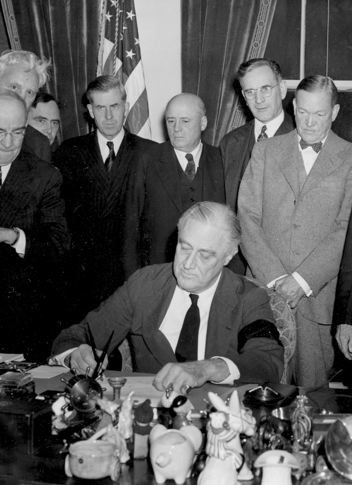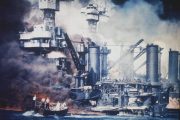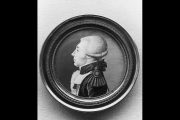
A second interpretation: President Franklin D. Roosevelt, General George C. Marshall, and Admiral Harold Stark received the warnings and intercepts, but somehow “blundered” and forgot to warn Pearl Harbor. However, there is too much evidence of deliberate calculation. One does not become president of the United States or Army Chief of Staff through gross stupidity. It was FDR himself who said: “In politics, nothing happens by accident. If it happens, you can bet it was planned that way.”
A third interpretation, now widely held, concedes that FDR, Marshall, and Stark knew of the attack but let it happen so the United States could enter World War II in order to oppose the spread of totalitarianism. This view was even expressed in the documentary Sacrifice at Pearl Harbor, produced by cable’s History Channel, which normally takes more orthodox positions on history.
According to this latter interpretation, FDR sacrificed the fleet because Hitler had to be stopped. Otherwise, once the Germans and Japanese finished subduing Europe and Asia, they would turn on America, and conquer the whole world, with Hitler’s troops eventually goose-stepping through New York City. Also, it is said, FDR cared deeply about those suffering in Hitler’s concentration camps. Only by inciting the Japanese to attack would America have the unity and resolve to support Roosevelt in these noble objectives.
This explanation, however, does not withstand scrutiny. The overextended Germans gave up any hope of invading Britain as feasible, and if the Germans were incapable of an amphibious assault across the English Channel, they certainly could not have launched one across the Atlantic. As Charles Lindbergh reasoned before Pearl Harbor: “Let us not be confused by this talk of invasion…. Great armies must still cross oceans by ship…. No foreign navy will dare approach within bombing range of our coasts. Let us stop this hysterical chatter of calamity and invasion.”
The claim that Roosevelt was motivated by opposition to totalitarianism and concern for concentration camp victims is sharply contradicted by his support for Soviet dictator Josef Stalin. Like Hitler, Stalin was an international aggressor. Few remember that the 1939 invasion of Poland — World War II’s immediate spark — was actually a joint invasion by Germany and the Soviet Union. In 1939-40, Stalin also invaded Finland, occupied Lithuania, Latvia and Estonia, and annexed part of Romania. Furthermore, Stalin, like Hitler, slaughtered millions of his own people, including some six million during the Ukrainian genocide (1932-33) alone. Nevertheless, FDR, without bothering with congressional approval, began bestowing lend-lease aid on Stalin in 1941, assistance that would ultimately amount to $11 billion (more than $100 billion in today’s currency).
As former President Herbert Hoover recalled: “In June 1941, when Britain was safe from German invasion due to Hitler’s diversion to attack Stalin, I urged that the gargantuan jest of all history would be our giving aid to the Soviet government. I urged that we should allow those two dictators to exhaust each other. I stated that the result of our assistance would be to spread Communism over the whole world…. The consequences have proved that I was right.”
A Plausible Explanation
There is a fourth explanation for Pearl Harbor, one more consistent with the facts: The role of pro-Communist and globalist influences within the FDR administration. As former Navy Secretary Frank Knox wrote: “Collectivists of every sort support Mr. Roosevelt. That is natural. For at the root of his philosophy lies the view, shared alike by Communists and Fascists, that individual liberty under democracy as hitherto practiced in this country is no longer desirable or feasible.”
The president’s closest advisor was Harry Hopkins, who, uniquely, lived inside the White House. The recently released Venona materials (Soviet messages decrypted by the U.S. during the 1940s) reveal that Hopkins was working for Soviet Intelligence. In his book KGB: The Inside Story, former KGB Colonel Oleg Gordievsky identified Hopkins as “an agent of major influence.” This would not shock those familiar with From Major Jordan’s Diaries, a 1952 book published by George Racey Jordan. Jordan, a lend-lease expediter, along with numerous other witnesses, testified that Hopkins, who oversaw Russia’s lend-lease shipments, had given the Soviets nuclear materials as well as purloined blueprints for the atomic bomb.
The State Department’s Alger Hiss, long-since exposed as a Soviet spy, was FDR’s right-hand man at the Yalta Conference, where the president made a stream of concessions to Soviet dictator Stalin.
Harry Dexter White, the president’s assistant Treasury secretary, has been well-documented in FBI and congressional investigations as a Soviet spy. Besides giving classified information to the Soviets, White supplied them with paper, ink, and printing plates for the production of occupation currency in postwar Germany.
George Marshall, Army Chief of Staff, was thoroughly documented as a Communist sympathizer in America’s Retreat from Victory (1951) by Joseph McCarthy, the U.S. senator whose accusations, though maligned for decades, have been historically vindicated. Marshall’s intervention on behalf of Mao Tse-tung, at the height of the Chinese civil war, is just one of many examples of his leftwing leanings. As for his infamous “horseback ride” of December 7, 1941, which allegedly prevented him from warning Pearl Harbor in time, that cover story was inadvertently blown by Arthur Upham Pope, in his 1943 biography of Maxim Litvinoff, the Soviet ambassador to the United States. Litvinoff first arrived in Washington on the morning of December 7th, 1941 — a highly convenient day to seek additional aid for the Soviets — and, according to Pope, was met at the airport that morning by General Marshall.
Hopkins, Hiss, White, and Marshall represent just a handful of known Soviet agents and abettors within the Roosevelt administration. FDR’s most severe sanctions against Japan — such as his all-out embargo and closing of the Panama Canal to Japanese shipping — came in July 1941. On June 22, 1941, the Germans had invaded the Soviet Union and were decimating the Soviet armies before them. Stalin’s worst fear was that Japan would join its Axis partner and invade from the East. Had this occurred, especially without FDR’s $11 billion in aid, it is virtually certain that the Soviet Union would have been destroyed and world Communism with it.
It is logical that the Soviet agents in the Roosevelt administration, like Stalin himself, panicked in July 1941 and urged the President to take extreme measures against Japan. Roosevelt’s embargo was joined by the British and (with U.S. pressure) the Dutch. The embargo forced Japan to divert attention from Russia, and to instead invade Southeast Asia in an attempt to obtain the raw materials — especially oil and rubber — which the embargo denied them.
Internationalism
Finally, we cannot underestimate the role of capitalist-veneer globalists who have often worked hand-in-hand with Communists. America’s main voice for globalism has always been the private Council on Foreign Relations (CFR), for decades the chief supplier of top State Department executives. The well-financed, influential Council was born in 1921 in New York, as a direct response to U.S. refusal to join the League of Nations after World War I. When World War II loomed, Council publications began clamoring for entry into the war — not so much as a means to peace, but to world government. During World War II, the CFR succeeded in making itself an adjunct of the U.S. government through the secret War and Peace Studies Project. Unknown to the public, the Council, which coined the term “United Nations,” formulated the original plans for the UN (which is a framework for world government), the IMF (the foundation for a world issuer of currency), and the Marshall Plan (a would-be cornerstone for a U.S.-European Union). Although these institutions were officially formalized or introduced at the UN Founding Conference in San Francisco, the Bretton Woods Conference, and George Marshall’s famous Harvard speech, all were secret brainchilds of Council study groups. To the liberal Establishment running the CFR, like the Communist agents in the Roosevelt administration, Pearl Harbor may have been viewed as a small price to pay in order to obtain such objectives.
* This Communist-globalist interpretation will seem radical to many, but is most consistent with the facts. Leaders do not allow their own fleet to be sunk, and thousands of their countrymen to be murdered, out of “nobility.” If Roosevelt and Marshall were motivated by nobility, why did they not send a last-minute warning to Hawaii, so our men could have at least been at their guns when the Japanese arrived? If noble, why did Washington continue using Kimmel and Short as scapegoats even after the war was long won? And if it was necessary to provoke the Axis powers to war to stop aggression and brutality, why was it never necessary to provoke Stalin — an equally brutal and aggressive dictator?
* For a more complete discussion of the CFR, see the author’s book The Shadows of Power: The Council on Foreign Relations and the American Decline.
This article originally appeared in the June 4, 2001 issue of The New American.
Related articles:
Pearl Harbor: Hawaii Was Surprised; FDR Was Not
Pearl Harbor: Scapegoating Kimmel and Short
Photo of FDR: AP Images



